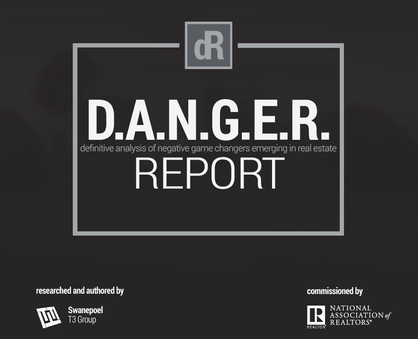The D.A.N.G.E.R. Report:
Report Commissioned by the N.A.R. is the Key to Getting Realtors' Attention (and Ultimately Earning their Loyalty)

"After buying and selling a few houses I would rate real estate agents just barely above the drug cartels when it comes to morality and honesty." -- "Jay P. Consumer" (commenting on the D.A.N.G.E.R. Report in the Washington Post
The National Association of Realtors, under the auspices of its Strategic Thinking Advisory Committee, commissioned Stefan Swanepoel and the Swanepoel T3 Group to uncover, research, and index the potential threats facing the real estate industry.
Their report, the D.A.N.G.E.R. Report (Definitive Analysis of Negative Game Changers Emerging in Real Estate) was issued by the NAR on May 15, 2015.
You can download it here for free: http://www.dangerreport.com/
This is an extraordinary and concise report on the dangers confronting the five faces of the real estate world: Agents, Brokers, the NAR, its State & Local Associations, and the MLS.
Mortgage loan officers who want to get or grow their share of purchase origination business would help themselves by understanding the major trends affecting Realtors – because Realtors still refer about 80% of homebuyers to their eventual lenders. And loan officers who want to receive these referrals must find legal, RESPA-compliant ways to help agents attract, retain, and close buyer leads and seller listings.
If you're one of my coaching clients, or if you have followed my writing and seminars on the subject of working with Realtors, you will find that the D.A.N.G.E.R. Report contains a significant amount of information that confirms much of what I have been teaching loan officers for years.
In this article, I am going to focus on a few key points from the report:
The National Association of Realtors, under the auspices of its Strategic Thinking Advisory Committee, commissioned Stefan Swanepoel and the Swanepoel T3 Group to uncover, research, and index the potential threats facing the real estate industry.
Their report, the D.A.N.G.E.R. Report (Definitive Analysis of Negative Game Changers Emerging in Real Estate) was issued by the NAR on May 15, 2015.
You can download it here for free: http://www.dangerreport.com/
This is an extraordinary and concise report on the dangers confronting the five faces of the real estate world: Agents, Brokers, the NAR, its State & Local Associations, and the MLS.
Mortgage loan officers who want to get or grow their share of purchase origination business would help themselves by understanding the major trends affecting Realtors – because Realtors still refer about 80% of homebuyers to their eventual lenders. And loan officers who want to receive these referrals must find legal, RESPA-compliant ways to help agents attract, retain, and close buyer leads and seller listings.
If you're one of my coaching clients, or if you have followed my writing and seminars on the subject of working with Realtors, you will find that the D.A.N.G.E.R. Report contains a significant amount of information that confirms much of what I have been teaching loan officers for years.
In this article, I am going to focus on a few key points from the report:

Masses Of Marginal Agents Destroy Reputation
According to the report, "the real estate industry is saddled with a large number of part-time, untrained, unethical, and/or incompetent agents. This knowledge gap threatens the credibility of the industry."
The authors of the report say it is far too easy for someone to obtain a real estate license, and continuing education requirements are too low. The problem is exacerbated by the perception that selling real estate is a good way to make a lot of money. In order to enter any of the professions like medicine, the law, accounting, or engineering, one must commit to thousands of hours of study – just to get a bachelors degree. In contrast, the report points out that in order to become a licensed real estate agent, one only needs to complete an average of 70 hours of study, whereas to become a cosmetologist, you need an average of 372 hours – 300 hours of study more than is needed to negotiate and conclude the largest transaction most people will make in their lives.
There are many thousands of Realtors who are professional, competent, and ethical, and these real estate professionals have become increasingly aware that the less qualified agents in their midst are hurting the reputation of all Realtors.
According to the report, "the real estate industry is saddled with a large number of part-time, untrained, unethical, and/or incompetent agents. This knowledge gap threatens the credibility of the industry."
The authors of the report say it is far too easy for someone to obtain a real estate license, and continuing education requirements are too low. The problem is exacerbated by the perception that selling real estate is a good way to make a lot of money. In order to enter any of the professions like medicine, the law, accounting, or engineering, one must commit to thousands of hours of study – just to get a bachelors degree. In contrast, the report points out that in order to become a licensed real estate agent, one only needs to complete an average of 70 hours of study, whereas to become a cosmetologist, you need an average of 372 hours – 300 hours of study more than is needed to negotiate and conclude the largest transaction most people will make in their lives.
There are many thousands of Realtors who are professional, competent, and ethical, and these real estate professionals have become increasingly aware that the less qualified agents in their midst are hurting the reputation of all Realtors.

The Decline In The Relevancy Of Agents
The report says, "The role, function, and perceived value of agents deteriorates as agents fail to properly assess and respond to changing consumer demands and expectations."
Interviews of real estate industry leaders revealed a strong consensus that while real estate salespeople at the local level generally had a good awareness of their inventory, they had very little understanding of what consumers want today. Nor did they have a sense of the many ways in which consumers have changed in recent years. As the report states, "the problem is that consumers don't care about agents – as much as agents would like to think consumers do." There is a widening gap between what consumers want, and what agents are prepared to provide.
The report goes on to point out that "numerous participants in the industry are guilty of violating key parts of The Consumer Bill of Rights, especially the consumers’ rights to be informed (of all the facts), to choose (from among competing services), and to be heard (to have all their questions understood and answered). The root cause is often the failure to listen, or worse, appearing to listen but failing to respond by focusing on the transaction and not the consumer."
In most other industries, companies and their sales forces focus on promoting the benefits of their products; the role of the salesperson is secondary. But in real estate, agents tend to prioritize their personal branding; they pay more attention to selling themselves than they do to selling homes. As the report points out, "Too many real estate agents believe their role is critical and their relationship with home buyers and sellers is beyond reproach. It’s that kind of overconfidence that often results in failure."
The report says, "The role, function, and perceived value of agents deteriorates as agents fail to properly assess and respond to changing consumer demands and expectations."
Interviews of real estate industry leaders revealed a strong consensus that while real estate salespeople at the local level generally had a good awareness of their inventory, they had very little understanding of what consumers want today. Nor did they have a sense of the many ways in which consumers have changed in recent years. As the report states, "the problem is that consumers don't care about agents – as much as agents would like to think consumers do." There is a widening gap between what consumers want, and what agents are prepared to provide.
The report goes on to point out that "numerous participants in the industry are guilty of violating key parts of The Consumer Bill of Rights, especially the consumers’ rights to be informed (of all the facts), to choose (from among competing services), and to be heard (to have all their questions understood and answered). The root cause is often the failure to listen, or worse, appearing to listen but failing to respond by focusing on the transaction and not the consumer."
In most other industries, companies and their sales forces focus on promoting the benefits of their products; the role of the salesperson is secondary. But in real estate, agents tend to prioritize their personal branding; they pay more attention to selling themselves than they do to selling homes. As the report points out, "Too many real estate agents believe their role is critical and their relationship with home buyers and sellers is beyond reproach. It’s that kind of overconfidence that often results in failure."

Entry By A New Player
From the report: "The current warlike environment in real estate becomes attractive to a large non-industry company that sees opportunity ...
"In an industry that is based on information as its core, we continue to caution against selling or providing that information to 'third-parties'. Many feel that MLSs should have been the biggest protector of the information, but instead many believe they have become the direct opposite; the primary distributor of data. The fear is that data is flowing everywhere and if it isn’t managed, brokers and agents will see their influence and power diminish in the future ...
"Many MLS organizations fear that a large company like Google could fall in love with real estate, along with its many resources. With a market cap of $356 billion and an insatiable appetite for acquiring companies, buying a large real estate portal and becoming a dominant player in the MLS or portal world is not too big of a stretch."
Technology companies like Google – or any number of large companies already operating in the real estate sector, like Zillow – could turn access to MLS data into an opportunity to provide a full range of real estate services to consumers looking for newer, cheaper, and/or more efficient ways to buy and sell homes.
25 years ago, if you wanted to buy or sell a home, you called a Realtor. Real estate agents were literally the only game in town, and for most people, they remain so today. But many consumers, especially younger ones, are beginning to express dissatisfaction with the "old-school" nature of the real estate world, and if agents (and their companies) fail to recognize and respond to these challenges, they could end up watching their business disappear.
From the report: "The current warlike environment in real estate becomes attractive to a large non-industry company that sees opportunity ...
"In an industry that is based on information as its core, we continue to caution against selling or providing that information to 'third-parties'. Many feel that MLSs should have been the biggest protector of the information, but instead many believe they have become the direct opposite; the primary distributor of data. The fear is that data is flowing everywhere and if it isn’t managed, brokers and agents will see their influence and power diminish in the future ...
"Many MLS organizations fear that a large company like Google could fall in love with real estate, along with its many resources. With a market cap of $356 billion and an insatiable appetite for acquiring companies, buying a large real estate portal and becoming a dominant player in the MLS or portal world is not too big of a stretch."
Technology companies like Google – or any number of large companies already operating in the real estate sector, like Zillow – could turn access to MLS data into an opportunity to provide a full range of real estate services to consumers looking for newer, cheaper, and/or more efficient ways to buy and sell homes.
25 years ago, if you wanted to buy or sell a home, you called a Realtor. Real estate agents were literally the only game in town, and for most people, they remain so today. But many consumers, especially younger ones, are beginning to express dissatisfaction with the "old-school" nature of the real estate world, and if agents (and their companies) fail to recognize and respond to these challenges, they could end up watching their business disappear.
Where do Loan Originators Fit In?
The D.A.N.G.E.R. Report exposes 50 different risks facing the real estate industry. The NAR commissioned this report, and it remains to be seen whether the organization, through its state and local affiliates, will take action to address the challenges outlined in the report. For example, the industry could move toward strengthening the licensing and continuing education requirements for real estate agents – before some government agency intervenes (à la the CFPB) and takes over the job itself.
Likewise, MLS vendors could reform and modernize their systems to allow local agents to regain control of the monetary value of their listings' lead generation capability. If consumers could easily access the MLS directly, and if the MLS system itself enabled consumers to access the information that is most important to them, the role of the local Realtor would be enhanced, and the attraction of the various commercial portals would diminish.
These kinds of changes would have to be initiated at the national level, and there is nothing that you, as a loan originator, can do to make it happen.
However, the local real estate agents you work with are the proverbial canaries in the coal mine. They are the first people to be affected by the challenges described in the D.A.N.G.E.R. Report, and while your Realtors may not necessarily be seeing the big picture presented in the report, they are already feeling the effects. And they cannot afford to wait for the NAR to implement top-down solutions to their problems.
This is where you come in. I recommend the following action steps:
The D.A.N.G.E.R. Report exposes 50 different risks facing the real estate industry. The NAR commissioned this report, and it remains to be seen whether the organization, through its state and local affiliates, will take action to address the challenges outlined in the report. For example, the industry could move toward strengthening the licensing and continuing education requirements for real estate agents – before some government agency intervenes (à la the CFPB) and takes over the job itself.
Likewise, MLS vendors could reform and modernize their systems to allow local agents to regain control of the monetary value of their listings' lead generation capability. If consumers could easily access the MLS directly, and if the MLS system itself enabled consumers to access the information that is most important to them, the role of the local Realtor would be enhanced, and the attraction of the various commercial portals would diminish.
These kinds of changes would have to be initiated at the national level, and there is nothing that you, as a loan originator, can do to make it happen.
However, the local real estate agents you work with are the proverbial canaries in the coal mine. They are the first people to be affected by the challenges described in the D.A.N.G.E.R. Report, and while your Realtors may not necessarily be seeing the big picture presented in the report, they are already feeling the effects. And they cannot afford to wait for the NAR to implement top-down solutions to their problems.
This is where you come in. I recommend the following action steps:
- Download and read the Danger Report.
- Share and Discuss the report with Realtors you know or are meeting for the first time.
- Questions to ask:
- The report says that marginal agents are hurting the reputation of professional, competent, and ethical agents. How big a problem do you think this is here in our market? What do you do to distinguish yourself from these marginal agents when you speak to a new lead or a prospect?
- The report says that many agents fail to properly assess and respond to changing consumer demands and expectations. How do you think consumer demands and expectations have changed over the last 8 to 10 years? What do you think consumers want that they are not getting from most Realtors? What would you change about the way you serve your clients, so that you stand out as an agent who really "gets it" and gives your clients service that is superior to what other agents are giving their clients?
- The report says that Realtors have lost control of their business because there are so many portals consumers can access to get information about homes for sale in our area, and that these portals (like Zillow) collect information on consumers, and then turn around and sell it to your competitors. How big a problem do you think this is? How do you think you might be able to regain control over the leads generated by your own listings?
- If we define a lead as someone who contacts you for information about buying or selling a home, how many leads would you estimate you generate per month?
- Let's say that half the leads that contact you are serious, and will buy or sell a home sometime in the next year. How many "serious" leads does that give you per month?
- How many buyer-side closings do you average per month?
- How many listings you sell on average per month?
- How many total transactions/sides?
- Divide your total number of sides per month by the total number of serious leads you get per month. What's your closing percentage?
- If you subtract the total number of sides you close per month from the total number of serious leads you get per month, how many serious leads are you "losing" to your competition each month?
- Multiply the number of serious leads you are losing each month by your average commission. That is the total monthly cost of the opportunities you are missing.
- I think if we worked together, I could help you recapture a significant piece of that lost opportunity cost.
- If I can help you do that, would it be worth an hour or so of your time to talk about how we can make that happen?
